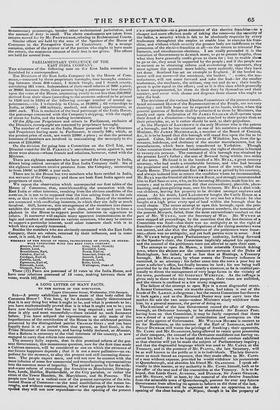PARLIAMENTARY INFLUENCE OF THE • EAST INDIA COMPANY.
.Tna substance of the following note on the East India connexion is furnished by a correspondent.
. Ten Directors of the East India Company sit in the House of Corn. mons' —returned by three proprietary boroughs, four boroughs contain- .ing between them 850 voters, 1 Scotch burgh, and 1 Scotch county, . containing 161 votes. Independent of their small salaries of 300/. a piece, or 3000/. between them these persons bring a patronage to bear directly upon the votes of the douse, amounting yearly to not less than 250,000/. derived from their share (according to the accounts ordered to be printed in 1826 and in 1829) of the following average number of annual ap- .pointments,—viz. 1 writership to China, at 10,0001. ; 68 writerships to . India, at 50001.; 460 military, medical, and clerical appointments, at 5001. each. This is exclusive of the local patronage of the India House, the patronage connected with the Company's shipping, with the supply of stores for India, and the trading investments.
Of the fifty-one Proprietors and others in Parliament, exclusive of the Directors, twenty-eight are returned by proprietary boroughs.
The number of votes at the India House possessed by the Directors and Proprietors having seats in Parliament, is exactly 100; which, at the present price of stock, are worth 2200/. a piece ; so that the personal interests of members are involved in maintaining the monopoly to the extent of 220,000/.
. On the division for going into a Committee on the Civil List, one Director voted for Sir H. PARNELL's amendment, seven against it, and . three were absent—whose friends and relations, however, voted with the Minister.
There are eighteen members who have served the Company in India, hfteen being retired servants of the East India Company itself. Six of the eighteen members receive pensions from the Company, amounting to from 10001. to 2000/. a year each. There are in the House but two members who have resided in India, not servants of the Company ; and these are both East India agents and proprietors of stock.
. We repeat the observation which accompanied our first tables of the House of Commons, that, notwithstanding the connexion with the East India or other interests, resulting from the obvious condition of the mem!Jer, it is not to be supposed that the bias arising from it is the sole one, or that it is sufficient to overrule all others. Many of the members are connected with conflicting interests, in which they are folly as much involved. Still, however, this arrangement of the members into classes . exhibits the abstract strength of each class, and its capacity to form a phalanx in the House to support peculiar interests in opposition to others. It moreover will explain many apparent inconsistencies in the logic and conduct of members on various occasions, who may be content to support a particular interest, until other interests clash with it in .which they are equally interested.
Besides the members who are obviously connected with the East India Company, there are others, returned by their influence, and in some cases, it is said, by their funds.
• SUMMERS OF THE HOUSE OF PEERS, PROPRIETORS OF STOCK, OR OTHER- WISE CONNECTBD WITH TES BAST INDIA. COMPANY.
Aboyne, Earl of, Gray, Lord, (Scotch)
Bexley, Lord, • Kinnaird, Lord, Breadalbane, Earl, Powis, Earl of, Caledon, Earl of, Somerset. Duke of, Cardigan, Earl of, Stowell, Lord, Colville, Lord, Romney, Lord, Egremont, Earl of, Rolle, Lord, Exmouth, Lord, Wellington, Duke of. Glasgow, Earl of,
These (17) Peers are possessed of 31 votes 'at the India House, and have near relations possessed of 18 votes, making between them 49 votes, worth 107,800/.


























 Previous page
Previous page